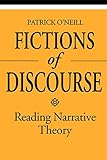Fictions of Discourse : Reading Narrative Theory / Patrick O'Neill.
Material type: TextSeries: Theory / CulturePublisher: Toronto : University of Toronto Press, [1996]Copyright date: ©1996Description: 1 online resource (190 p.)Content type:
TextSeries: Theory / CulturePublisher: Toronto : University of Toronto Press, [1996]Copyright date: ©1996Description: 1 online resource (190 p.)Content type: - 9781442674868
- 808 22
- PN212 .O645 1996
- online - DeGruyter
| Item type | Current library | Call number | URL | Status | Notes | Barcode | |
|---|---|---|---|---|---|---|---|
 eBook
eBook
|
Biblioteca "Angelicum" Pont. Univ. S.Tommaso d'Aquino Nuvola online | online - DeGruyter (Browse shelf(Opens below)) | Online access | Not for loan (Accesso limitato) | Accesso per gli utenti autorizzati / Access for authorized users | (dgr)9781442674868 |
restricted access online access with authorization star
http://purl.org/coar/access_right/c_16ec
The fundamental principle upon which contemporary narratology is constructed is that narrative is an essentially divided endeavour, involving the story (`what really happened') and the discourse (`how what happened is presented'). For traditional criticism, the primary task of narrative discourse is essentially to convey the story as transparently as possible. Patrick O'Neill investigates the extent to which narrative discourse also contains the counter-tendency not to tell the story, indeed to subvert the story it tells in foregrounding its own performance. The systemic implications of this perspective for narrative and for narrative theory are examined within the conceptual framework provided by classical French narratology. O'Neill ultimately attempts both to expand and to problematize the structural model of narrative proposed by this centrally important tradition of narrative theory. O'Neill describes narrative as functioning in terms of four interacting levels: story, narrative text, narration, and textuality. Using a range of examples from Homer to modern European fiction, he discusses traditional narrative categories such as voice, focalization, character, and setting, and reinscribes them within the contextual space of author and reader to bring out narrative's potential for ambiguity and unreliability. He also discusses the implications of translation for narrative theory.
Mode of access: Internet via World Wide Web.
In English.
Description based on online resource; title from PDF title page (publisher's Web site, viewed 01. Nov 2023)


